The Samsung Galaxy S6 and S6 edge Review
by Joshua Ho on April 17, 2015 9:00 AM EST- Posted in
- Smartphones
- Samsung
- Mobile
- Galaxy S6
- Galaxy S6 Edge
NAND Performance: The First UFS Phone
Storage performance is often a critical area for user performance, as applications cannot be cached in RAM at every possible moment. Camera performance is also often limited by storage performance as RAM buffers can only do so much to maintain performance before it’s necessary to commit photos to non-volatile storage.
However due to the memory hierarchy to some extent, storage performance is often hard to notice once it’s at a point where things are “good enough”. Unfortunately, in some cases we can see OEMs failing to include sufficiently performant solid-state storage, which can be a major pain point in the user experience when random read/write performance is low enough that there are noticeable IO pauses as the system has to wait for data to be loaded from storage.
The Samsung Galaxy S6 family is the first shipping implementation of UFS (Universal Flash Storage) 2.0 standard, which makes the internal storage model less like an SD card in nature. When comparing the eMMC 5.1 standard to the UFS 2.0 standard, we see a move from a the 400 MB/s maximum of the eMMC 5.1 standard with HS400 physical link interface to MIPI M-PHY, which allows for a theoretical maximum of around 720 MB/s and should be more efficient in transmitting data than the current eMMC standard. In addition, UFS makes it possible to do full duplex communication, which means that reads and writes can happen simultaneously. There's also a command queue, which helps to avoid inefficiencies that could arise from waiting for commands once a command has been processed by the storage controller, and utilizes the SCSI protocol to facilitate these new features at the interface level.
As for the Galaxy S6 itself, the UFS implementation Samsung is using is Samsung developed. Samsung's current implementation only supports up to 300 MB/s (or 2.4 Gbps) transfer rates as a theoretical maximum, so from an interface perspective it's still not reaching the full capabilities of the standard. Though even at a cap of 300MB/sec, it still stands to be a significant improvement over typical eMMC solutions.
Finally, on a technical note, the 32GB models are of the model KLUBG4G1BD-E0B1 with a maximum queue depth of 16.
In order to test storage performance, we use Androbench with some custom settings to get a reasonable idea of performance in this area, although this test isn’t an exhaustive examination of storage performance by any means.
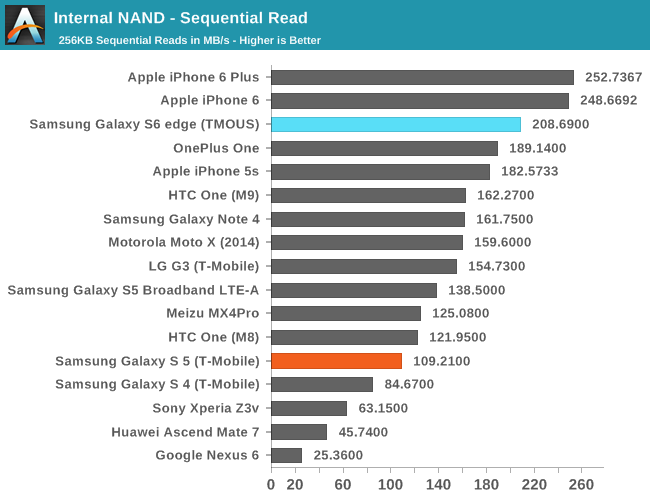
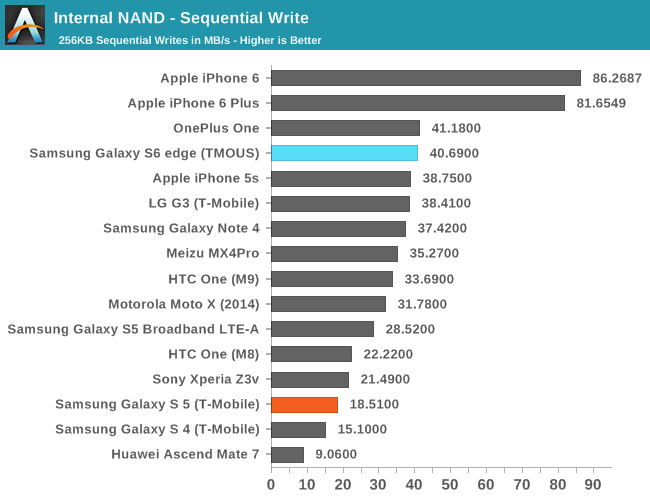
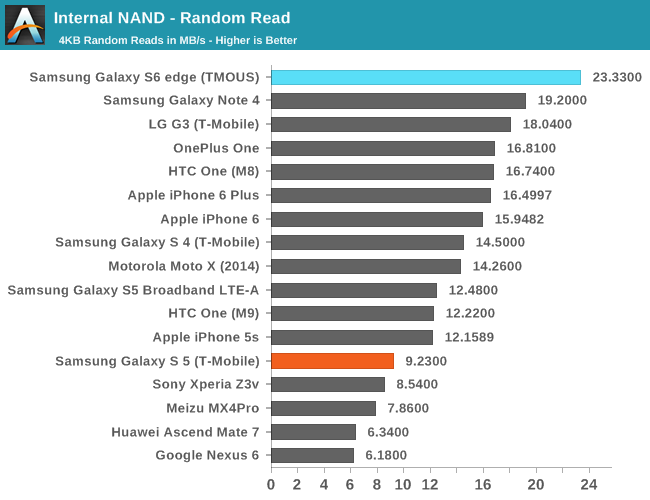
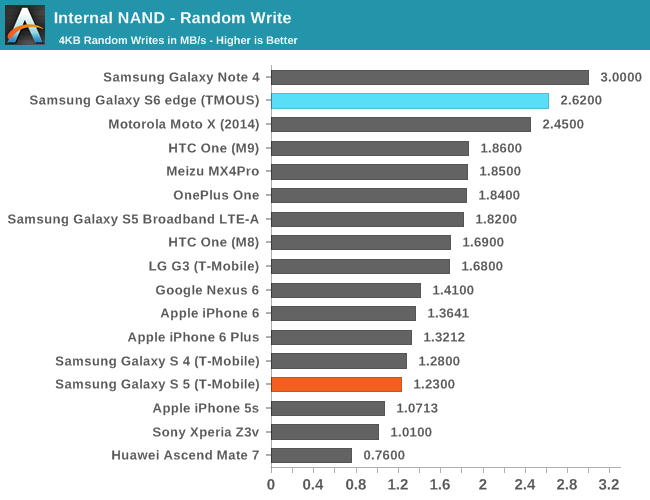
The Galaxy S6 performs rather impressively in our standard storage test, but not as fast as one might have hoped. This is due to the nature of the Androbench 3.6 test, which only tests a single IO thread, which won’t use the UFS storage of the Galaxy S6 to its full extent. In order to see the kind of difference that UFS really makes, I ran the same test again on Androbench 4.x, which does support multiple IO threads. However, as our iOS storage test and Androbench 3.6 don’t support more than a single IO thread we will continue to present both results for now.
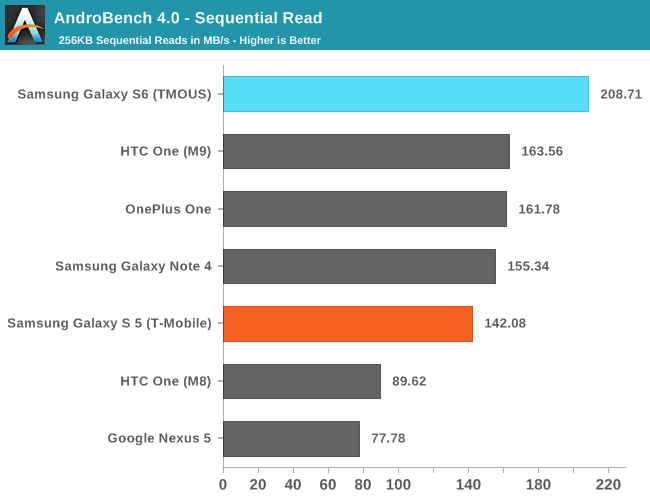
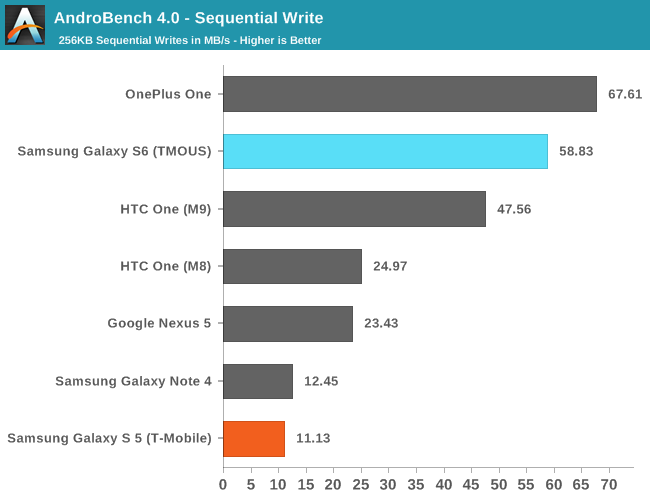
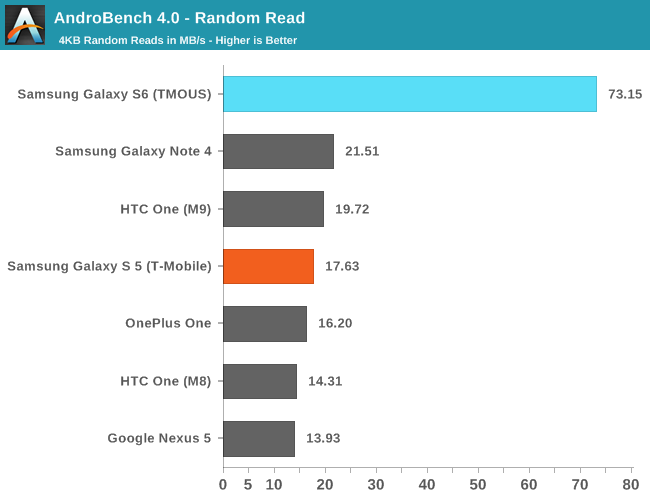
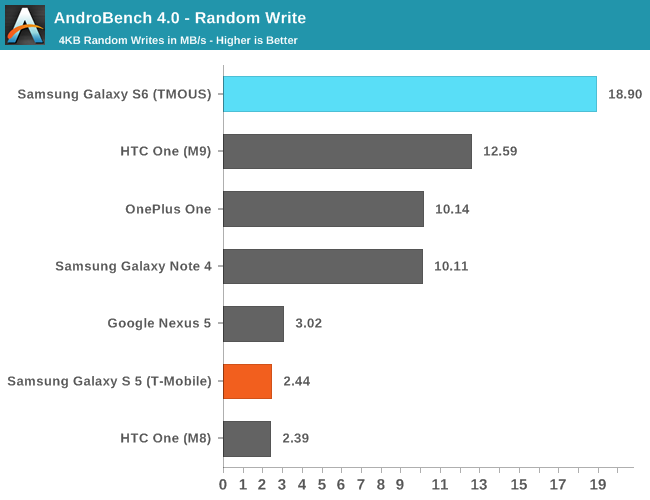
Overall, there are some immense benefits in storage performance here, especially in random IO performance. The Galaxy S6 has some of the fastest storage available in a phone today as far as I can tell given that this is basically a pure MLC solution, and shouldn’t have any real issue with storage performance holding back the rest of the phone over the course of 1-3 years as long as a reasonable amount of free space is kept to allow efficient storage management.


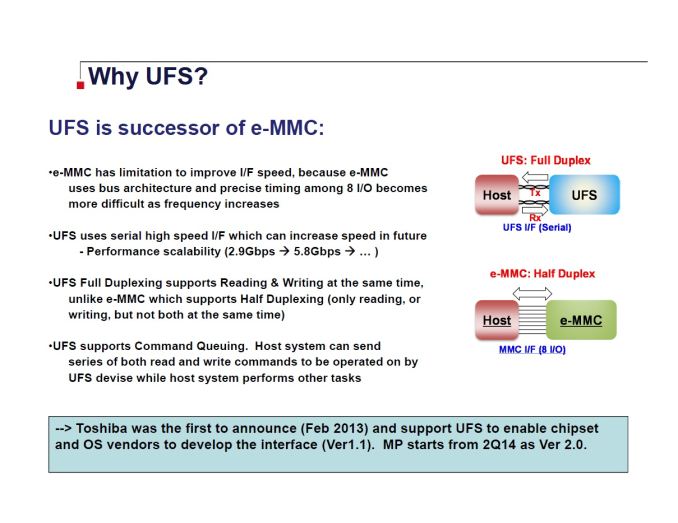








306 Comments
View All Comments
Margalus - Friday, April 17, 2015 - link
It's not "without" a warrant. Read what the op said and what I responded to. A judge legally subpoenaed the information and that person wants to hide it from the courts. Big difference from just grabbing your phone and getting the information without a subpoena.Buk Lau - Saturday, April 18, 2015 - link
Warrants and subpoenas are both writs, which the court issues with legally justified reasons. In essence they are the same thing, so unless you are actually engaged in illegal activities I see no reason to be scared that your fingerprint can get subpoenaed LOLFlushedBubblyJock - Friday, April 24, 2015 - link
you mean the court issues with any lies and excuses they so desire, including those far outside the spirit and letter of the lawthat's current reality sheepy
akdj - Sunday, May 31, 2015 - link
That's paranoid backwoods Idaho shit bub. Nothing to do with 'reality'LordConrad - Friday, April 17, 2015 - link
Lawyers and Doctors are examples of people with legal and sensitive information. Also corporations worried about corporate espionage. That's just off the top of my head, I'm guessing you didn't think before responding.Also, just because the average person has nothing to hide does not mean they should lose their right to protect their data.
Margalus - Friday, April 17, 2015 - link
I thought before responding. The key thing here is that a court issues a legal subpoena for the information. You are talking about hiding information from a judge that has legally subpoenaed the information. Unless what you are doing is illegal, there is no need to have to hide it from the court that legally subpoena's the information. And in fact you would be breaking more laws by trying to subvert a legal subpoenaNow if you are a child rapist that records what you do on your phone, I could understand about being worried about "legal" subpoenas.
LordConrad - Saturday, April 18, 2015 - link
You aren't subverting anything if you use a pattern or password lock, because knowledge CAN'T be subpoenaed as it's protected by the fifth amendment. Also, how many times have police agencies obtained information without due process? Good attorneys can usually get such information thrown out, but not always.akdj - Sunday, May 31, 2015 - link
You're in luck. In order TO USE the fingerprint system, one must 'choose a password, pattern ...' (Possibly tgird choice, can't remember not gonna look) as a backup. So you're both gonna be alright. Just quit with the paranoia. Judges, lawyers and doctors don't have things to hide in their cell phones, anymore than a CEO of a corporation or Jony Ive that a court's going to subpoena its contents without damn good reason.Let's see how far ol Tom Brady wants to 'appeal' this decision. After talking to Goddell, if the suspension is upheld, Tom won't be able to hide, dispose of or erase the contents of his cell phone, iPad or computer ...however he communicated with 'the deflator' -- the court can absolutely then subpoena his phone, as well as the ball boys' phones. They should be worried. If you should, maybe you should check yourself.
It's like the paranoia of cloud storage, using Google or allowing 'Pop Ups'. It's irrelevant what you're doing to 'hide'. You can't. If you're online, everything you do is forever embedded somewhere, in some server, and won't go away.
Like BubblyJack below me (jocks don't spend all day bagging on Apple when no one else has mentioned them) -- digital paranoia is silly, unless you're doing something illegal and IMHO, if you are and these tools catch you, AWESOME, more power to the 'tools, capturing digital thieves, identity thieves and phishing antagonists, child porn traders and drug sales sites like the Silk World Take down recently, torrenting sites stealing music and TV or movies --- they're all bad, they all suck, and they should be exsposed
** I'm in no way endorsing government censorship or web oversite, including the ability to gamble, watch porn ( of age ) --- even buy weird, niché stuff, but breaking the law is braking the law, and we've got internationally recognized 'law' and morales that I'm absolutely for 'governing' online. It would really suck if the 'net was somehow broken because of the 1%'ers, and not holding back your information can't 'teach' systems like Google more than they can hurt us when it comes down to it **
akdj - Sunday, May 31, 2015 - link
Last line was supposed to be allowing our information to Google CAN teach the 'systems' and in turn, Us more about ourselves. Interests. Health. Shopping deals and aggregation of our own data, pictures, media collections and management. If we allow it to, we're just a number in a pot of hundreds of millions.FlushedBubblyJock - Friday, April 24, 2015 - link
lordconrad, the sheep have been trained, expect no enlightenment, no western standards, and no cluethus we have the current situation, all the data is mined and bluffdale is packed to the gills
the retards won't believe no matter how many times they are informed and it is proven to them, and their pat answer is : what does it matter anyway!!??!! ( only a criminal would care )
so I'm not certain how eggheads have become glorious useful idiots, other than the wool is so thick there's no meat on them bones, and the shrunken brain has crumbled to coddled dust